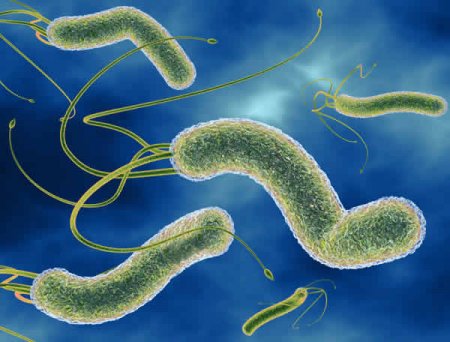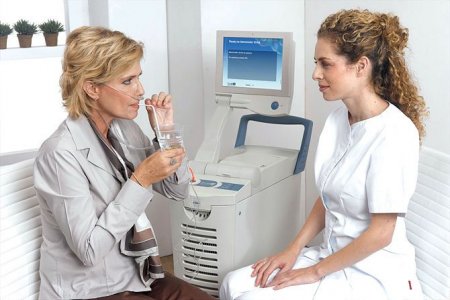Helicobacter pylori - Causes, Symptoms and Treatment
According to medical statistics, helicobacter, which infected about 60% of all mankind, is the most common infectious disease in humans after herpes.
Infection with the bacterium Helicobacter occurs through muddied water or food and after contact with an infected person through saliva or mucus released during coughing or sneezing.
Infection with Helicobacter Pilori happens so easily, what is considered a family disease - while infecting one family member, 95% are infected with everyone else, and for a long time, the infected person can not guess about the disease and did not experience any painful symptoms.
As in the case of diseases thrush, herpes zoster, human papilloma virus, fungal nail disease, and many other viral and fungal infections, Helicobacter activation occurs only when the body's defenses are weakened and no longer cope with the pathogens.
Once causes low immunity (under the influence of strong stress, cold-related infections, injuries, intoxications, hormonal disruption), dormant in the body for a long time and not giving themselves known bacterium "wakes up" and begins its destructive effects. Moreover, very often people do not understand what was happening to him and to no avail treated for other diseases.
The bacterium Helicobacter, in contrast to other micro-organisms proved to be able to survive in the acid environment of the stomach, which was previously thought impossible, because, as known, most of the bacteria and viruses due to the high acidity of the die immediately. This discovery has made a real revolution in medicine, and its authors have received in 2005 the prestigious Nobel Prize.
Helicobacter symptoms and diagnosis
Helicobacter is attached to the walls of the stomach and duodenum, and may remain there for many years, parasitic and waiting for an opportune moment to activate.
With the weakening of the body's defenses, bacteria begins to multiply rapidly, while stressing the huge amounts of toxins and enzymes that cause damage to mucous membranes.
As a result, damage to the integrity of the walls of the stomach and duodenum, they appear chronic inflammation and ulcers.
Currently scientifically proven that Helicobacter bacteria is the main culprit for the development of gastritis and ulcers (80% of cases), as well as increased risk of cancer of the stomach and duodenum, although earlier it was believed that these diseases arise from poor nutrition, smoking, abuse alcohol and stress.
Symptoms of Helicobacter pylori is quite varied:
frequent constipation and diarrhea,
heartburn,
nausea,
heaviness and pain in the abdomen,
vomiting,
belching,
allergy,
poor digestibility of meat products,
hair loss,
bad taste and odor from the mouth (in the absence of dental problems)
Nail fungal diseases and their excessive fragility,
early satiety after meals,
periodic pain in the stomach, stop soon after a meal.
Modern diagnostic methods allow helikobakterioza accurately and quickly determine the presence of harmful microorganisms in the body.
breath test
The most common method of early diagnosis - breath test on helicobacter.
It has a sensitivity of almost 90%, however, it is important to study not only qualitatively to clean teeth but tongue and throat to prevent false test results.
Analysis of blood and biological materials
In addition to the breath test, carried out in the laboratory blood test for helicobacter, the so-called serum by enzyme immunoassay (ELISA) to determine the presence of antibodies to the bacteria in the blood plasma.
In modern laboratories and a method using PCR (polymerase chain reaction) is the most accurate and allows to determine not only helikobakterioza pathogen in blood but also in other biological materials such as feces or in saliva.
Fibrogastroduodenoscopy (EGD)
To 100% - the first confirmation of the diagnosis and assess the severity of lesions of the mucous membrane of the stomach can be assigned fibrogastroduodenoscopy (EGD). In this study, the patient swallows a probe, and a doctor - a gastroenterologist examines the state of the inside of the stomach and takes for histological examination a small amount of mucosal cells.
Given that patients infected with Helicobacter suffer in 3 - 5 times more often from cancer of the stomach diseases, fibrogastroduodenoscopy is very important, as it helps significantly to exclude or confirm the diagnosis of gastric cancer.
Helicobacter treatment and prevention
Treatment of Helicobacter pylori causes much controversy among physicians as eradication, ie, the total destruction of microorganism is shown only in individual cases. The fact that a complete extermination of H. pylori is problematic - eradication treatment is the use of a whole group of antibiotics, and the bacterium to many of them is resistant, i.e. stable.
If the patient is when - something already accepted the appointed doctor antibiotic treatment they will be ineffective. Furthermore, the use of antibiotics often leads to the death of the useful intestinal flora (dysbacteriosis) and the development of multiple allergies.
Therefore, H. pylori-positive patients with eradication therapy is recommended only in the following cases:
gastric ulcer and duodenal ulcer;
MALT-lymphoma;
atrophic gastritis;
after gastrectomy for cancer;
close relatives suffering from cancer of the stomach.
Sometimes prescribed for patients with eradication and long digestion disorders, such as functional dyspepsia, however, when it is necessary very thorough examination of the patient to exclude other causes of those disorders.
In other cases, H. pylori treatment regimen is the appointment of drugs that regulate the level of acidity in the stomach and a special diet. Feeding the patient should be a fraction, avoid excessive stretching of the stomach and regular - you need to eat in a strictly certain hours, not allowing long intervals between meals and receptions without using too hot or too cold food.
Dietary food with Helicobacter pylori infection depends on the level of acidity in the stomach and requires consultation with your doctor, but general guidelines are the same for all patients with diseases of the gastro - intestinal tract. It is necessary to refuse from fatty, spicy, salty, smoked and fried foods, pickles, spices, carbonated beverages and alcohol. Chew be long and thoroughly throughout the day drink sufficient water - at least two liters per day, depending on the body weight.
Folk treatment helikobakterioza
In addition, good effect and treatment of Helicobacter folk remedies using herbs and concoctions fees. A well-chosen national treatment of Helicobacter pylori normalize gastric acidity and eliminates pain in the abdomen.
With increased acidity perfectly helps decoction of flax seed, which gently envelops, softens and restores the injured gastric mucosa, and promotes healing of ulcers. Article 1.5. l. seeds pour 1 cup boiling water, leave for 15 minutes, then strain and take 3 times a day for 1 tablespoon half an hour before a meal.
Good lower acidity herbal chamomile, St. John's wort, yarrow and celandine, mixed in equal proportions. 1 tbsp. spoon herb mixture pour a glass of boiling water and leave for 2 hours for infusion. Take 1 tbsp. spoon 3 - 4 times daily.
At low acidity is useful to drink before each meal by 1/2 cup freshly prepared cabbage juice or a decoction of the roots of calamus. (4 tablespoons pour 1.5 liters of boiling water, infuse for half an hour in a water bath and take 1/2 cup before meals).
There are cases of rapid and complete expulsion (eradication) of H. pylori bacteria after treatment of Helicobacter folk remedy consisting of alcoholic infusion of wormwood leaves and pumpkin seeds (in equal proportions):
Herbal mixture is poured into half-liter jar 1/3 volume and poured up to the top 40% ethanol solution.
Insist 7 days in a warm and dark place, filter and take 25 ml before meals in the morning and evening for 2 weeks.
However, this method can be used not for everyone, since it is possible irritant effect of alcohol on the gastric mucosa, especially in exacerbations of peptic ulcer disease.


